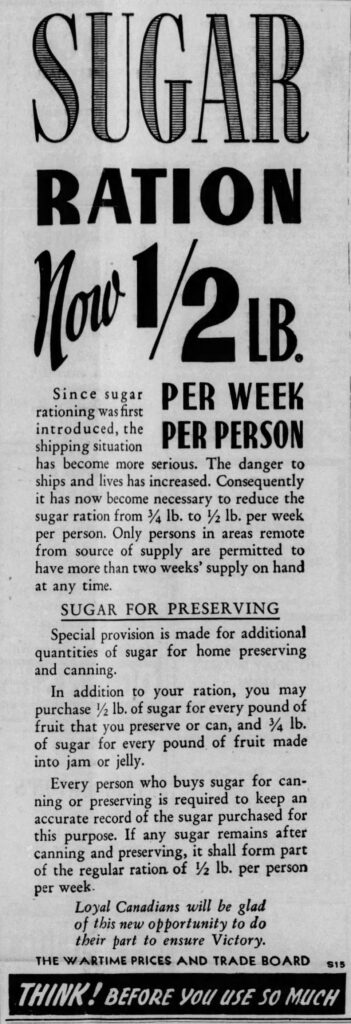The Second World War caused the population of Surrey to grow incredibly quickly. Many families of men who were in the service found that Vancouver and the surrounding areas were inviting locations to wait out the war. Additionally, wartime jobs drew many to Vancouver, and these people found cheaper homes in places like Surrey. Having so many newcomers at once put a strain on facilities, such as electricity, water, and schools, while tax revenue from these individuals did not rise quickly enough to cover the gap. Despite the growing population there was still a labour shortage in the agricultural industry due to men joining the war effort. This labour shortage was exacerbated by the removal of the many Japanese farmers in 1942, who made up a large part of the agricultural industry in Surrey. Agriculture remained immensely important in Surrey, but new industries and businesses grew during the war years.1
Home life in Surrey was further challenged by the War Measures Act, which empowered the federal government to bring in rationing of necessities, including butter, sugar, meat, coffee, rubber tires, and gas. Canada’s many Victory Loan campaigns convinced many to purchase War Savings Certificates and Victory Bonds. Surprise air raid drills become a part of life. Precautionary blackouts, which occasionally caused all nighttime public gatherings to be banned also affected the lives of Surrey residents. During blackout conditions high school students experienced changes in their school schedule, as well as school events, with them being dismissed earlier in the day.2


Next Page → The War’s Impact on School Conditions
References
- Jane K. Watt. Surrey: A City of Stories. (City of Surrey, Heritage Services, 2017)., 175-177. ↩︎
- Emilie L. Montgomery “‘The War Was a Very Vivid Part of My Life’: British Columbia School Children and the Second World War,” 1991. https://search.ebscohost.com/login.aspx?direct=true&AuthType=sso&db=ddu&AN=6709D90C094B80FA&site=eds-live., 110.; “Public Functions Banned by A.R.P. for Time Being.” The Surrey Leader (Surrey, BC, Canada), December 10, 1941. Accessed through Surrey Archives.; The School Reporter. “Semiahmoo Sidelines.” The Surrey Leader (Surrey, BC, Canada), November 25, 1942. Accessed through Surrey Archives.; Watt. Surrey: A City of Stories, 175. ↩︎